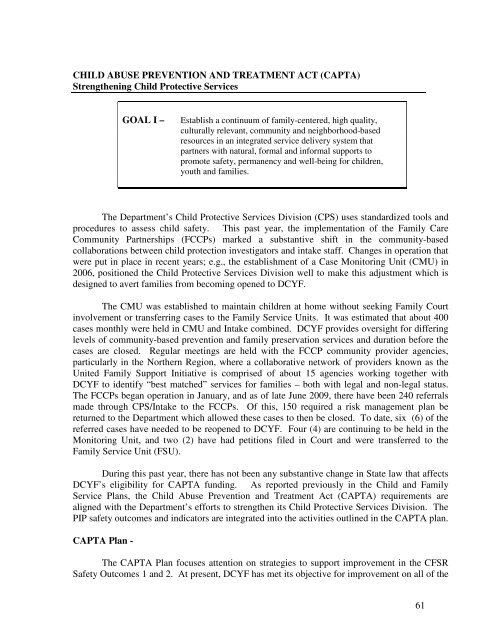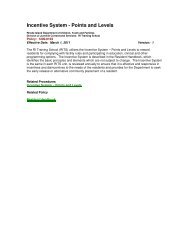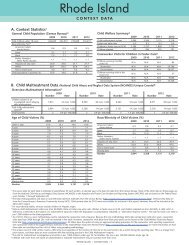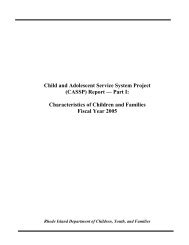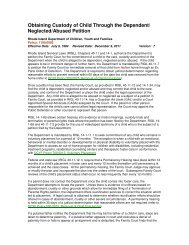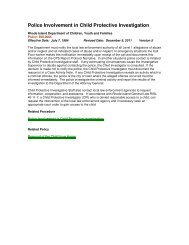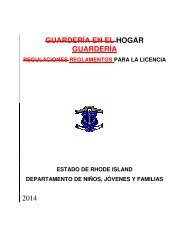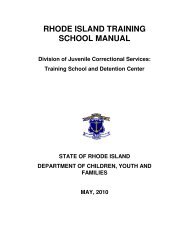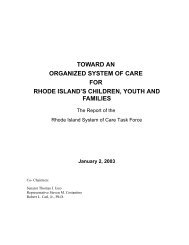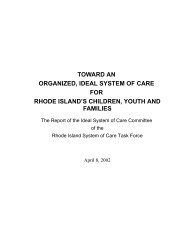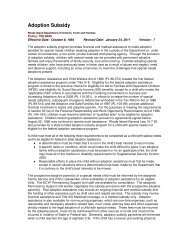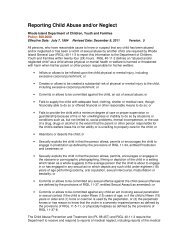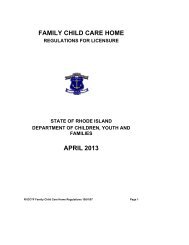CFSP 5 Year Plan - RI Department of Children, Youth & Families
CFSP 5 Year Plan - RI Department of Children, Youth & Families
CFSP 5 Year Plan - RI Department of Children, Youth & Families
Create successful ePaper yourself
Turn your PDF publications into a flip-book with our unique Google optimized e-Paper software.
CHILD ABUSE PREVENTION AND TREATMENT ACT (CAPTA)<br />
Strengthening Child Protective Services<br />
GOAL I –<br />
Establish a continuum <strong>of</strong> family-centered, high quality,<br />
culturally relevant, community and neighborhood-based<br />
resources in an integrated service delivery system that<br />
partners with natural, formal and informal supports to<br />
promote safety, permanency and well-being for children,<br />
youth and families.<br />
The <strong>Department</strong>’s Child Protective Services Division (CPS) uses standardized tools and<br />
procedures to assess child safety. This past year, the implementation <strong>of</strong> the Family Care<br />
Community Partnerships (FCCPs) marked a substantive shift in the community-based<br />
collaborations between child protection investigators and intake staff. Changes in operation that<br />
were put in place in recent years; e.g., the establishment <strong>of</strong> a Case Monitoring Unit (CMU) in<br />
2006, positioned the Child Protective Services Division well to make this adjustment which is<br />
designed to avert families from becoming opened to DCYF.<br />
The CMU was established to maintain children at home without seeking Family Court<br />
involvement or transferring cases to the Family Service Units. It was estimated that about 400<br />
cases monthly were held in CMU and Intake combined. DCYF provides oversight for differing<br />
levels <strong>of</strong> community-based prevention and family preservation services and duration before the<br />
cases are closed. Regular meetings are held with the FCCP community provider agencies,<br />
particularly in the Northern Region, where a collaborative network <strong>of</strong> providers known as the<br />
United Family Support Initiative is comprised <strong>of</strong> about 15 agencies working together with<br />
DCYF to identify “best matched” services for families – both with legal and non-legal status.<br />
The FCCPs began operation in January, and as <strong>of</strong> late June 2009, there have been 240 referrals<br />
made through CPS/Intake to the FCCPs. Of this, 150 required a risk management plan be<br />
returned to the <strong>Department</strong> which allowed these cases to then be closed. To date, six (6) <strong>of</strong> the<br />
referred cases have needed to be reopened to DCYF. Four (4) are continuing to be held in the<br />
Monitoring Unit, and two (2) have had petitions filed in Court and were transferred to the<br />
Family Service Unit (FSU).<br />
During this past year, there has not been any substantive change in State law that affects<br />
DCYF’s eligibility for CAPTA funding. As reported previously in the Child and Family<br />
Service <strong>Plan</strong>s, the Child Abuse Prevention and Treatment Act (CAPTA) requirements are<br />
aligned with the <strong>Department</strong>’s efforts to strengthen its Child Protective Services Division. The<br />
PIP safety outcomes and indicators are integrated into the activities outlined in the CAPTA plan.<br />
CAPTA <strong>Plan</strong> -<br />
The CAPTA <strong>Plan</strong> focuses attention on strategies to support improvement in the CFSR<br />
Safety Outcomes 1 and 2. At present, DCYF has met its objective for improvement on all <strong>of</strong> the<br />
61


